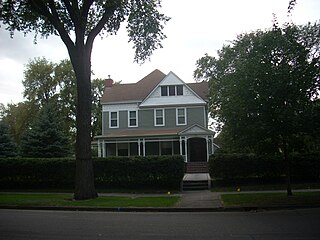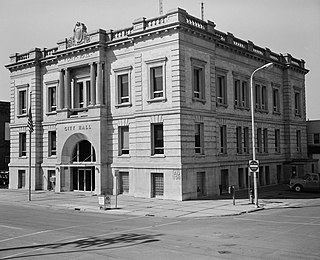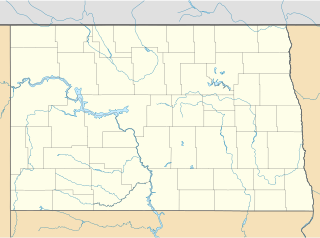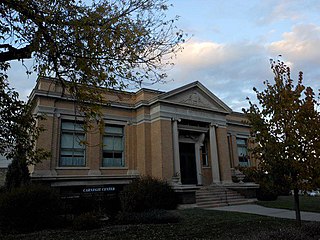
The Watts Towers, Towers of Simon Rodia, or Nuestro Pueblo are a collection of 17 interconnected sculptural towers, architectural structures, and individual sculptural features and mosaics within the site of the artist's original residential property in Watts, Los Angeles. The entire site of towers, structures, sculptures, pavement and walls were designed and built solely by Sabato ("Simon") Rodia (1879–1965), an Italian immigrant construction worker and tile mason, over a period of 33 years from 1921 to 1954. The tallest of the towers is 99.5 feet (30.3 m). The work is an example of outsider art and Italian-American naïve art.

The Grand Forks Herald is a daily broadsheet newspaper, established in 1879, published in Grand Forks, North Dakota, United States. It is the primary daily paper for northeast North Dakota and northwest Minnesota. Its average daily circulation is approximately 7,500, in the city of Grand Forks plus about 7,500 more to the surrounding communities. Total circulation includes digital subscribers. It has the second largest circulation in the state of North Dakota.
A Carnegie Library is a library built with money donated by Scottish-American businessman and philanthropist Andrew Carnegie.

There are 461 properties and historic districts listed on the National Register of Historic Places in North Dakota. There are listings in 52 of North Dakota's 53 counties.

This is a list of the National Register of Historic Places listings in Dakota County, Minnesota. It is intended to be a complete list of the properties and districts on the National Register of Historic Places in Dakota County, Minnesota, United States. Dakota County is located in the southeastern part of the U.S. state of Minnesota, bounded on the northeast side by the Upper Mississippi River and on the northwest by the Minnesota River. The locations of National Register properties and districts for which the latitude and longitude coordinates are included below, may be seen in an online map.

This is a list of the National Register of Historic Places listings in Grand Forks County, North Dakota. This is intended to be a complete list of the properties and districts on the National Register of Historic Places in Grand Forks County, North Dakota, United States. The locations of National Register properties and districts for which the latitude and longitude coordinates are included below, may be seen in an online map.

This is a list of the National Register of Historic Places listings in Brookings County, South Dakota.

This is a list of the National Register of Historic Places listings in Jerauld County, South Dakota.

The George B. Clifford House is a Queen Anne style Victorian home located in the Near Southside Historic District of Grand Forks, North Dakota. It is listed on the National Register of Historic Places.

North Dakota State University District is a 36-acre (15 ha) historic district on the campus of North Dakota State University, in Fargo, North Dakota, that was listed on the National Register of Historic Places in 1986.

The University of North Dakota Historic District is a 127-acre (51 ha) area in Grand Forks, North Dakota that was listed as a historic district in the National Register of Historic Places on January 13, 2010.

Grand Forks City Hall is a building in Grand Forks, North Dakota that was listed on the National Register of Historic Places in 1982.

The Valley City Barnes County Public Library, also known as Valley City Public Library or the Valley City Carnegie Library, in Valley City, North Dakota is a Carnegie library that was built in 1903. It was listed on the National Register of Historic Places in 1979.

Theodore B. Wells (1889-1976) was an American architect. He was born in North Dakota. He studied at L'ecole des Beaux Arts. Back in North Dakota, he designed many public and commercial buildings.

St. Boniface Cemetery, Wrought-Iron Cross Site is a 3.1-acre (1.3 ha) cemetery in Benson County, North Dakota, United States, several miles to the East-North East of Selz that was listed on the National Register of Historic Places in 1989. It was associated with the later demolished St. Boniface Catholic church which was located on the opposite side of the road – thus in Pierce County – and active from 1905 through 1930. It mainly served a population of Germans from Russia.

Joseph A. Shannon (1859-1934), known in at least one source as John A. Shannon, was an architect in Devils Lake, North Dakota.

The Alfred E. Dickey Free Library in Jamestown, North Dakota was built in 1917. It was listed on the National Register of Historic Places in 1980.

Minot Carnegie Library on 2nd Ave., SE, in Downtown Minot, North Dakota.

The Hallowell Historic District encompasses the historic 18th and 19th-century heart of Hallowell, Maine. The city developed as a major port on the Kennebec River, during which time its downtown and adjacent residential area were built up. Fully half of the area's more than 400 buildings were built before 1865. The district was listed on the National Register of Historic Places in 1970.
The National Register Information System (NRIS) is a database of properties that have been listed on the United States National Register of Historic Places. The database includes more than 84,000 entries of historic sites that are currently listed on the National Register, that were previously listed and later removed, or that are pending listing. The database includes approximately 45 pieces of data for each listed property. Accuracy of the NRIS database may be imperfect. For example, a 2004 paper addressed accuracy of spatial location data for part of the NRIS content.





















